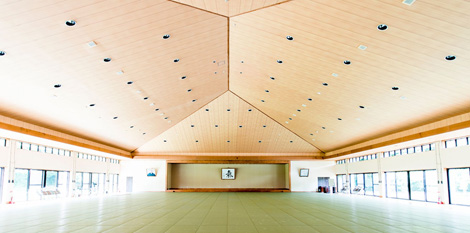In late May, I had an opportunity to go hiking in the mountains of Yugawara in Kanagawa Prefecture. Even in early summer, you could hear the splendid “ho-hokekyo!” call of the Japanese bush warbler. I experienced an indescribably enriching feeling. Japanese bush warblers, also known as “haru-tsuge-dori” [literary “bird that announces the arrival of spring] can actually be heard until summer. It is a call that males use to invite females to their territory during the breeding season, and once the breeding season ends, in the fall and winter, the call changes to a “chat chat” sound.
When I stopped to listen to their calls, however, I found that some warblers making awkward and unsure-sounding calls, like “ho…ho…ke?” Apparently, there are individual differences in the way Japanese bush warblers sing, and there is a degree of skill involved. I was curious, so I looked it up and found out that the beautiful call of the Japanese bush warbler is not something they are born with, but acquired through repeated vocal practice!
It is true that even humans, when we try to “speak well,” our voices become strained and high-pitched. It must be because cultivating a beautiful voice comes from relaxing all unnecessary tension and using one’s whole body as one. It seems that the Japanese bush warblers are no different in that steady training is essential to mastering the art, and when I came across a Japanese bush warbler that could not sing well, I wanted to watch over with kindness.
The quality of our “breathing” determines the quality of our “vocalization”. To speak means to exhale, and deep breathing makes the voice calm and easy to convey the message to others. Shallow breathing can make others feel uncomfortable.
Breathing reflects the state of our mind. When our mind is disturbed such as when we are angry, overly tense, upset, or worried, our breathing also becomes disturbed. When we speak emotionally, it is reflected in the roughness of our breathing and in our vocalization, which causes unconscious resistance and rejection in the other person, making it impossible to get our message across. When we talk about important matters, it is even more important for us to keep calm. When our breathing calms down, the sound of our voice changes and it becomes easier for the other person to understand us.
I heard an interesting story from a person who came to participate in the Ki Breathing seminar. This person is a school instructor and has many opportunities to teach students. One concern he had was that even though he was courteous in his attitude and use of language, he often faced resistance from his students, which led to conflicts.
When I mentioned the relationship between breathing and vocalization during the course of the lecture, he seemed to have come to the conclusion that he might have been the cause of the problem. “Is it my voice that might be irritating or annoying them?”
He immediately started working on it and found out that by calming his breathing and then speaking, he had fewer conflicts not only with students at the school, but also with his family.
When our voice changes, our relationship changes. There is no shortage of such examples. Ki breathing is a specific way to calm our breathing and is essential not only for good health, but also for smooth communication.
I, too, continue to refine my vocalization skill through breathing on a daily basis.
Translated by Mayumi Case
Edited by David Shaner
Eastern Ki Federation
https://easternkifederation.org/
Original article in Japanese: 声の質 (Koe no Shitsu)
June 1, 2025




